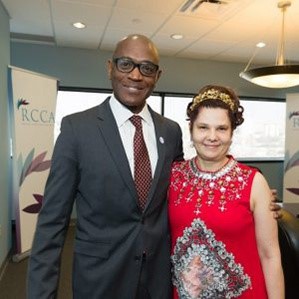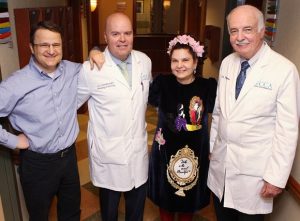The way cancer is treated is changing. Physicians will soon approach a patient’s cancer the same way they approach a patient’s high blood pressure — as a serious condition that, while incurable, can be managed with medications that have few side effects, according to Iuliana Shapira, MD, chief medical officer for Regional Cancer Care Associates LLC, or RCCA.
“The main message I have for people dealing with cancer, and for their families, is one of hope,” Dr. Shapira said. “We are learning very fast how cancer starts, works, and travels. New therapies are invented every day. Patients should be optimistic.”
As the chief medical officer of RCCA, one of the nation’s largest networks of oncology specialists, Dr. Shapira is working to speed such advances so that patients can realize the benefits of an expanding understanding of cancer, of innovative therapies to treat cancer, and of the way cancer care is delivered.
Iuliana Shapira, MD, chief medical officer for Regional Cancer Care Associates.
The board-certified hematologist oncologist speaks as someone who has helped drive progress in cancer care. Dr. Shapira has conducted basic-science research in the role that ribonucleic acid (RNA) plays in the development of malignancies, and has done extensive clinical research in breast cancer, ovarian and gastrointestinal malignancies and drug development. She served for several years as associate professor of Medicine at the Hofstra North Shore-LIJ School of Medicine, and was director of its Center for Cancer Genetics and Cancer Control from 2008 to 2014. Before joining RCCA earlier this year, she served as division chief for Hematology and Oncology at SUNY Downstate Medical Center in Brooklyn.
The cancer specialist noted that RCCA has a strong track record of bringing cutting-edge therapies and clinical trials to community-based practices, where most cancer care in the United States is delivered.
“RCCA combines academic centers with community practices to pursue a very clear mission: Create an up-to-date, safe, and efficient office practice to deliver patient-centered cancer care,” Dr. Shapira said. “At RCCA, we place the patient at the center of our activities, and we are committed to wrapping services around the patients and offering them the best care in an appropriate and coordinated manner.”

RCCA, which has 30 care delivery sites in New Jersey, Connecticut, and the Maryland/Washington, DC area, offers patient navigation, financial navigation, financial assistance with copays, and health coaching, as well as care coordination. Meanwhile, RCCA doctors are part of the community fiber.
“They care for people they see in the grocery store, worship with, and whose children attend the same schools as their children,” Dr. Shapira said. “Our doctors own their patients’ problems. In addition, our academic medical center affiliate, the John Theurer Cancer Center of Hackensack University Medical Center, is an incubator of innovation. The breakthroughs discovered in academia are thus rapidly disseminated into all our practices.”
In her role as chief medical officer, Dr. Shapira is pursuing four goals with RCCA’s 120 physicians:
- Guaranteeing patient access in various community settings;
- Charting an optimal roadmap of care;
- Fostering an understanding of the whole cancer journey and its distinct components; and,
- Promoting the best quality cancer care and patient experiences while lowering the cost of care for patients.
One major focus for Dr. Shapira is expanding patient access to the many clinical trials offered at RCCA care sites. She also is working with physicians on the dissemination and implementation of tools and interventions that rapidly translate cutting-edge therapies into daily practice, to deliver the latest gains in cancer knowledge to vulnerable or difficult-to-reach populations, and to effectively monitor the quality of intervention delivery.
“Our aim is to bridge the gap between clinical research and everyday practice by building a knowledge base about how health information, new technologies and interventions, and new clinical practices and guidelines are translated into community-based healthcare,” Dr. Shapira said.
She said integrating diagnostic and treatment advances into community-based cancer care is critical given the move toward using highly individualized therapies that often target specific genetic mutations.
“Cancer is a disease of genes, and as we learn more about genetic changes in cancer that drive the ability of cells to multiply continuously, invade and spread, more treatments are coming to the market,” she said. “These treatments apply to specific patients with the mutation regardless of their cancer. For example, one specific mutation found in many cancers is V600E, found in a gene called BRAF. Any patient with this mutation, regardless of the specific cancer — melanoma, lung or colon cancer, or a form of leukemia — is able to respond to the same set of pills. We are rapidly moving away from organ-specific cancer treatment toward mutation-specific treatment. This is a revolution in the way we treat cancer.”
RCCA is well prepared to offer its patients the benefits of this treatment revolution. The network uses next-generation genomic sequencing of both the cancer and the patient’s own DNA make-up to identify the best precision medications for him or her. When applied correctly to patients’ DNA fingerprint, these new precision medications extend survival by more than three-fold compared to chemotherapy.
In many cases, physicians are able to test for these mutations in patients’ blood, avoiding additional biopsies. They also can test to see if a patient is well-suited for treatment with a variety of immune therapies, which are far more promising than older chemo treatments. Current treatments also include harnessing a patient’s immune systems with CAR-T cells, a form of cellular therapy proven to prolong life.
“We make every effort to identify every possible targeted therapy candidate and offer him or her the optimal treatment,” she said.

For care to be truly “patient-centered,” however, therapeutic advances must be matched by an evolution in the way patients move through the health care system, Dr. Shapira said, adding that this is a major area of focus for RCCA.
“For patients, the journey through cancer — from screening and prevention to diagnosis and treatment and disease resolution or end of life — is complex and multileveled. At each stage in that journey, their cancer is managed by personnel working within their own fields of expertise, often in total separation from others involved in the patient’s care,” she said. “RCCA was established to change this approach to cancer care. Our physicians integrated their practices with the aim of putting the patient first, and to deliver superior quality and the best value care to our patients. The RCCA model provides useful information for health care providers in determining how best to organize service delivery to achieve the best outcomes, and the best quality of care at the lowest cost for our patients. Our clinical integration allows our patients to be supported by nurse navigators and social workers who help break down the silos of care.”
That integration of care also encompasses close collaboration and communication with patients’ primary care physicians, Ob/Gyns, urologists, and other doctors. Dr. Shapira noted that RCCA’s commitment to providing value-based care is reflected in its participation in the Oncology Care Model created by the Centers of Medicare and Medicaid Services (CMS), the government agency that oversees the Medicare and Medicaid programs.
“We voluntarily submitted to intense scrutiny to show in a fully transparent manner that we offer the best care,” she said. “The next model of cancer care delivery will be created by the hard-working oncologists with RCCA at the forefront of innovation. I am honored to be part of this group.”
RCCA includes more than 80 physicians supported by 800 employees at 20-plus care delivery sites, providing care to more than 22,000 new patients annually and more than 225,000 existing patients. For more information, call (844) 928-0089 or visit www.RCCA.com.
